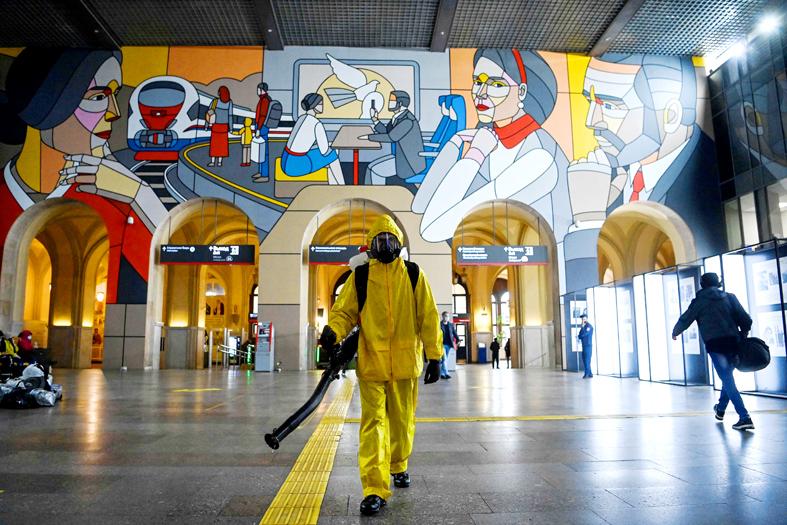Moscow, the capital of Europe’s worst COVID-19-hit nation, is to shut non-essential services between Thursday next week and Nov. 7, as deaths soar and vaccination rates stall in the country, Moscow Mayor Sergei Sobyanin said on Thursday.
Sobyanin announced the 11-day closure a day after Russian President Vladimir Putin ordered a nationwide paid week off at the end of this month to curb fast spreading infections.
Russia reported 1,036 COVID-19 deaths in a single day on Thursday, but officials have warned that the worst is yet to come, with only 35 percent of the population fully vaccinated against COVID-19.

Photo: AFP
Putin would have no in-person meetings during the non-working period, the Kremlin said.
Authorities have previously gone to great lengths to protect the 69-year-old, who the Kremlin says is fully vaccinated.
In the capital, the epicenter of Russia’s outbreak, Sobyanin said that all non-essential retail, sporting and entertainment venues must temporarily close, but shops selling food, medicine and other essentials would remain open.
Restaurants and cafes would be able to sell take-away food, he said in a statement.
Mass events would be banned, and schools would be closed, with the days off coinciding with national school holidays.
Theaters and museums can stay open, but entry would be allowed only with QR codes.
Separately, the Russian Ministry of Education recommended that schools nationwide shutter for a week.
Sobyanin said the measures were necessary because the “situation in Moscow is continuing to develop according to the worst-case scenario.”
When restrictions end on Nov. 8, Moscow would also halt free public transport passes for unvaccinated passengers older than 60 or with chronic disease.
Sobyanin said the move was aimed at “protecting the lives and health of the most vulnerable Muscovites.”
Officials this week said that the virus is spreading faster than ever, with Russia registering 36,339 new cases on Thursday.
Moscow Deputy Mayor Anastasia Rakova said hospitalizations had risen threefold within a month, linking it to the Delta variant of SARS-CoV-2.
She said that taking people off work was “one of the most effective epidemiological measures for large cities.”
Outside Moscow, Russia’s regions were also overwhelmed.
Authorities in Vladimir Oblast east of Moscow said that there were “practically no beds left” in COVID-19 ward intensive care units.
In the southwestern city of Voronezh, one of the worst-affected areas, authorities said that cemetery employees were “working to the limit” amid a steep rise in deaths.
Meanwhile, a Moscow official said that the capital’s cemeteries would continue working “as usual,” despite the non-working week.
Putin on Wednesday linked Russia’s high death rates to what he called an “unfortunately” low vaccination rate, and urged Russians to show “responsibility” and get the jab.
On a visit to the Kaliningrad on Thursday, Russian Prime Minister Mikhail Mishustin urged residents to respond to the president’s call.
“You heard what the president said about this. It is very important,” the RIA Novosti news agency cited Mishustin as saying.
Despite multiple pleas from Putin and the domestically developed Sputnik V COVID-19 vaccine being widely available since December last year, many Russians are reluctant to get vaccinated.
Kremlin spokesman Dmitry Peskov on Wednesday said that he had not been inoculated, pointing to “a high level of antibodies.”

‘IN A DIFFERENT PLACE’: The envoy first visited Shanghai, where he attended a Chinese basketball playoff match, and is to meet top officials in Beijing tomorrow US Secretary of State Antony Blinken yesterday arrived in China on his second visit in a year as the US ramps up pressure on its rival over its support for Russia while also seeking to manage tensions with Beijing. The US diplomat tomorrow is to meet China’s top brass in Beijing, where he is also expected to plead for restraint as Taiwan inaugurates president-elect William Lai (賴清德), and to raise US concerns on Chinese trade practices. However, Blinken is also seeking to stabilize ties, with tensions between the world’s two largest economies easing since his previous visit in June last year. At the
Nearly half of China’s major cities are suffering “moderate to severe” levels of subsidence, putting millions of people at risk of flooding, especially as sea levels rise, according to a study of nationwide satellite data released yesterday. The authors of the paper, published by the journal Science, found that 45 percent of China’s urban land was sinking faster than 3mm per year, with 16 percent at more than 10mm per year, driven not only by declining water tables, but also the sheer weight of the built environment. With China’s urban population already in excess of 900 million people, “even a small portion

UNSETTLING IMAGES: The scene took place in front of TV crews covering the Trump trial, with a CNN anchor calling it an ‘emotional and unbelievably disturbing moment’ A man who doused himself in an accelerant and set himself on fire outside the courthouse where former US president Donald Trump is on trial has died, police said yesterday. The New York City Police Department (NYPD) said the man was declared dead by staff at an area hospital. The man was in Collect Pond Park at about 1:30pm on Friday when he took out pamphlets espousing conspiracy theories, tossed them around, then doused himself in an accelerant and set himself on fire, officials and witnesses said. A large number of police officers were nearby when it happened. Some officers and bystanders rushed

Beijing is continuing to commit genocide and crimes against humanity against Uyghurs and other Muslim minorities in its western Xinjiang province, U.S. Secretary of State Antony Blinken said in a report published on Monday, ahead of his planned visit to China this week. The State Department’s annual human rights report, which documents abuses recorded all over the world during the previous calendar year, repeated language from previous years on the treatment of Muslims in Xinjiang, but the publication raises the issue ahead of delicate talks, including on the war in Ukraine and global trade, between the top U.S. diplomat and Chinese